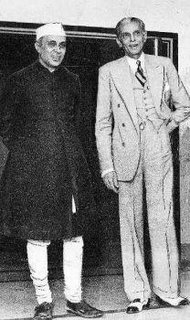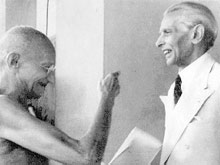 It has been believed that the sole responsibility for the greatest bloodshed of the Indian subcontinent and its partition goes to M A Jinnah, the founder of Pakistan. A cautious insight into the history reveals that this man tried a lot to avert the sequence of events as they took place leading to the partition. At every stage he oppposed the partition of India but emphasised the consideration of muslim-majority provinces.
It has been believed that the sole responsibility for the greatest bloodshed of the Indian subcontinent and its partition goes to M A Jinnah, the founder of Pakistan. A cautious insight into the history reveals that this man tried a lot to avert the sequence of events as they took place leading to the partition. At every stage he oppposed the partition of India but emphasised the consideration of muslim-majority provinces.We go back to the Cabinet Mission comprising of three cabinet mimisters which was sent by the British government in March 1946. It published 'the Mission's Plan' on May 16, 1946. According to the plan, the provinces were to be a part of the union which comprised of three groups- Group A (the states which now form the Indian union), Group B (consisting of Punjab, Sind, Baluchistan & NWFP) and Group C (consisting of Bengal and Assam). The provinces were given no rights to opt out of the union. All they could do was to ask for a reconsideration by the constituent assembly after 10 years. The inevitability of partition followed hereforth with the congress rejecting the plan. Jinnah supported it and he again emphasised that he was in favour of confederation not partition. The congress went on with its plan of getting power from British and settling all issues thereafter. Nehru pronounced-"We dont think that Mr Jinnah has any real place in this country." This was the foundation of all that followed.

Congress went on ignoring Jinnah and Muslim League which had as many as 73 seats as opposed to Congress' 207 seats in the constituent assembly. Gandhiji's plan was to wrest power and later on they pressed for partition instead of a union with 'intereferences by Jinnah' with the thoughts in mind that Pakistan would rejoin the union. The British were opposed to the idea of transfering powers to Congress as they had realised that Muslim League had support of masses of certain provinces. Hence, it pressed for an agreement between Congress and Muslim League over the issue. Gandhiji lead Congress into denying Jinnah and Muslim League and it went on even after the secret deal by Congress to wrest power failed.
 Jinnah accepted the proposal of the Confederation with three groups of provinces so that the Muslims get their rightful position but Congress had set its mind not to compromise and blindly went on rejecting Jinnah. Gandhiji wrote to Mountbatten asking him to leave the government of India to one party. What followed as a result was the Partition Plan published on June 3, 1947, accepted by both parties. If there was one visionary who had warned Congress against this consequence time and again, it was Azad. But unfortunately his voice couldn't avert the course of destiny and India was divided.
Jinnah accepted the proposal of the Confederation with three groups of provinces so that the Muslims get their rightful position but Congress had set its mind not to compromise and blindly went on rejecting Jinnah. Gandhiji wrote to Mountbatten asking him to leave the government of India to one party. What followed as a result was the Partition Plan published on June 3, 1947, accepted by both parties. If there was one visionary who had warned Congress against this consequence time and again, it was Azad. But unfortunately his voice couldn't avert the course of destiny and India was divided.
No comments:
Post a Comment